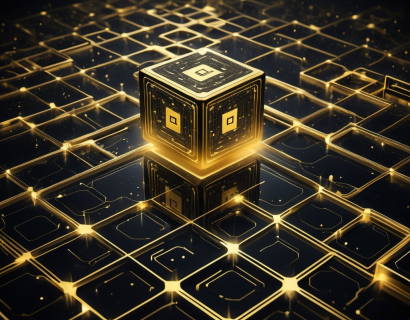Crypto-Powered AI Solutions: Transforming Digital Experiences
The intersection of cryptocurrency and artificial intelligence (AI) is giving rise to innovative solutions that are redefining digital experiences. This article delves into the cutting-edge technologies that combine blockchain and machine learning to create enhanced, secure, and personalized online interactions. For tech enthusiasts and professionals, understanding these advancements is crucial for staying ahead in the rapidly evolving tech landscape.
Understanding the Synergy Between Crypto and AI
The fusion of crypto and AI leverages the strengths of both technologies to address some of the most pressing challenges in digital interactions. Cryptocurrency, with its decentralized and secure nature, provides a robust foundation for building trust and ensuring transparency. AI, on the other hand, brings the power of machine learning and data analysis to create intelligent and adaptive systems. Together, they form a synergy that enhances security, personalization, and efficiency in digital experiences.
Enhanced Security Through Blockchain
One of the primary benefits of using crypto in AI solutions is the enhanced security it offers. Blockchain technology ensures that data transactions are immutable and tamper-proof, reducing the risk of data breaches and fraud. In the context of AI, this means that user data can be stored and processed in a secure manner, maintaining privacy and integrity. For instance, decentralized identity management systems use blockchain to give users control over their personal data, allowing them to share it selectively and securely with AI applications.
Personalized User Experiences with AI
AI's ability to analyze vast amounts of data and learn from patterns makes it an ideal partner for creating personalized digital experiences. By integrating AI with crypto, platforms can offer tailored content, recommendations, and services without compromising user privacy. For example, a crypto-powered recommendation engine can analyze a user's transaction history and preferences to suggest relevant products or services, all while ensuring that the data remains encrypted and secure.
Decentralized Machine Learning
Decentralized machine learning (DeML) is an emerging field that combines blockchain and AI to train machine learning models across multiple nodes in a decentralized network. This approach not only enhances the robustness and accuracy of AI models but also ensures that data remains decentralized and private. By using crypto tokens to incentivize data contributors and model trainers, DeML platforms create a collaborative ecosystem where participants are rewarded for their contributions, fostering a more democratic and transparent AI development process.
Benefits of Decentralized Machine Learning
- Data Privacy: DeML keeps data on users' devices, reducing the risk of centralized data breaches.
- Scalability: Distributed training allows for the use of more computational resources, leading to more accurate models.
- Incentivization: Crypto tokens reward participants for their contributions, aligning interests and encouraging participation.
Smart Contracts for Automated Interactions
Smart contracts, self-executing contracts with the terms directly written into code, play a crucial role in crypto-powered AI solutions. They automate processes and ensure that transactions are executed only when predefined conditions are met. In the context of AI, smart contracts can be used to manage data access, payment transactions, and even the deployment of AI models. This automation not only streamlines operations but also reduces the need for intermediaries, lowering costs and increasing efficiency.
Use Cases of Smart Contracts in AI
- Data Marketplaces: Smart contracts can facilitate secure and transparent data trading, ensuring that data providers are fairly compensated.
- AI Model Deployment: Smart contracts can automate the deployment and scaling of AI models based on demand, optimizing resource usage and reducing latency.
- Content Creation: AI-generated content can be monetized using smart contracts, ensuring that creators receive fair compensation for their work.
Tokenization of DigitalAssets
Tokenization, the process of converting real-world assets into digital tokens on a blockchain, is another area where crypto and AI intersect to enhance digital experiences. By tokenizing assets such as art, real estate, or even intellectual property, platforms can create fractional ownership and increase liquidity. AI can further enhance this process by analyzing market trends, predicting asset values, and optimizing trading strategies. This combination not only democratizes access to investment opportunities but also provides users with more informed and data-driven decision-making tools.
Impact of Tokenization on Digital Assets
- Increased Liquidity: Tokenization allows for easier buying, selling, and trading of assets, making them more liquid.
- Accessibility: Fractional ownership through tokens makes high-value assets accessible to a broader audience.
- Enhanced Valuation: AI-driven analytics can provide more accurate and timely valuations of tokenized assets.
Enhancing User Engagement Through Crypto-GAMING
Crypto-gaming is a fascinating application of crypto and AI that combines the immersive world of gaming with blockchain technology. In crypto-gaming, players can earn crypto tokens by participating in games, completing tasks, or contributing to the game's ecosystem. AI enhances this experience by creating dynamic and adaptive game environments, personalized challenges, and intelligent NPCs (non-playable characters). This not only increases user engagement but also provides a new revenue stream for game developers and platforms.
Key Elements of Crypto-Gaming
- In-Game Economies: Crypto tokens serve as the currency within games, enabling true economic interactions and ownership of in-game assets.
- Decentralized Governance: AI and blockchain can be used to create decentralized governance models where players have a say in the game's development and direction.
- Interoperability: AI-driven cross-platform solutions can allow players to carry their assets and achievements across different crypto-games, enhancing the overall experience.
Challenges and Considerations
While the potential of crypto-powered AI solutions is vast, there are several challenges and considerations that need to be addressed. Regulatory uncertainty, scalability issues, and the need for user education are among the key hurdles. Additionally, ensuring that these technologies are accessible and inclusive is crucial for widespread adoption. As the ecosystem continues to evolve, collaboration between developers, regulators, and users will be essential to overcome these challenges and realize the full potential of crypto and AI in digital experiences.
Regulatory Landscape
The regulatory environment for crypto and AI is still in its early stages, with var



